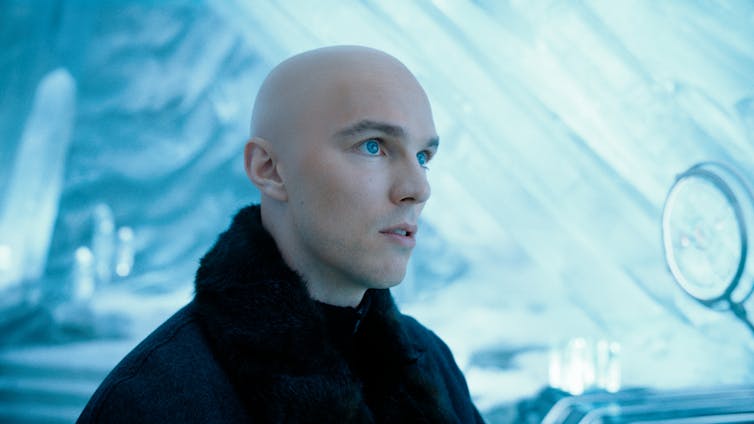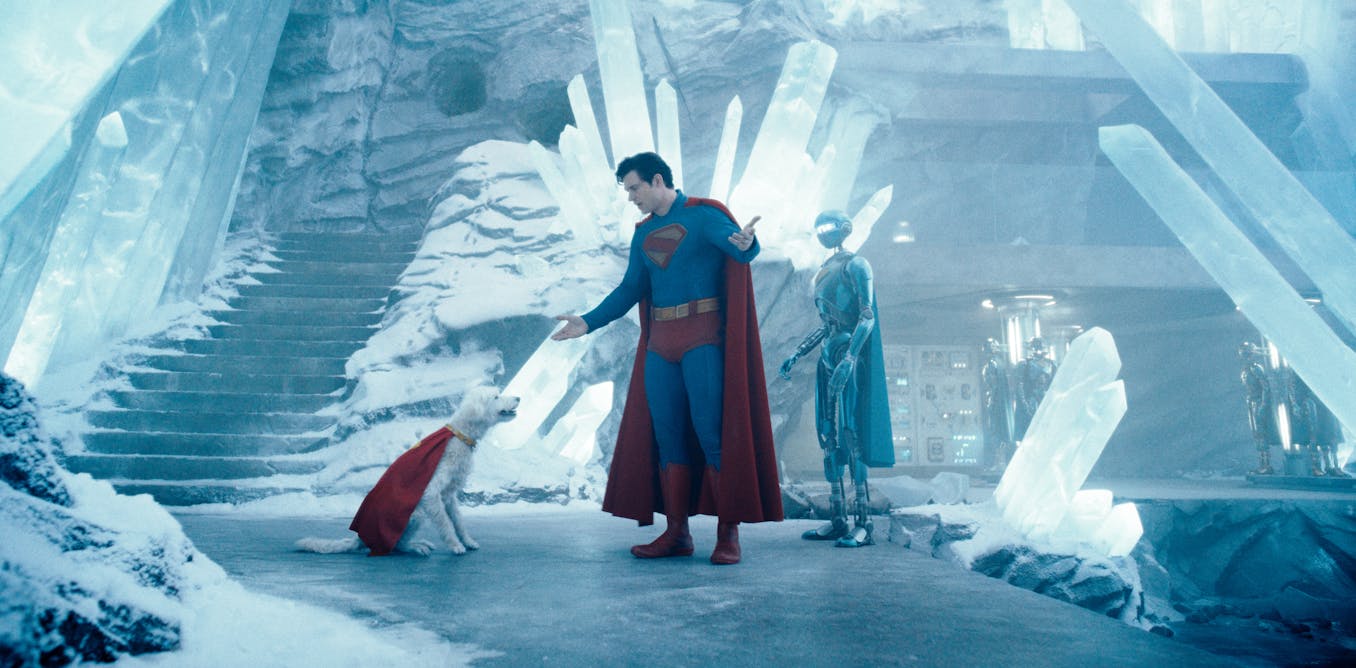The first two superhero movies of the year examined the morality of power and politics (Captain America: Brave New World) and mental health and personal accountability (Thunderbolts*) in thoughtful and often nuanced ways. It is rather depressing, then, that the third act of Superman is largely a prolonged CGI punch-fest that lacks any narrative or visual vigour to make it interesting.
There is a lot riding on the success of the DC Universe (DCU), now under the creative stewardship of director James Gunn and producer James Safran. After the varied fortunes of the DC Extended Universe (DCEU), this iteration of Superman marks a reboot of DC properties and is the introductory instalment of the first phase, or “chapter” as they are being called, with the subtitle Gods and Monsters.
The films also marks a shift from the “Snyderverse” – the series of interconnected films made under the oversight of director Zack Snyder – which were characterised by the darkness of both their themes and their aesthetics.
This darkness, and the attendant moral ambiguity, of the Snyderverse has been replaced by a more optimistic tone. This new Superman film is more simplistic and clear-cut, with good versus bad and a bright, comic-book design.
Looking for something good? Cut through the noise with a carefully curated selection of the latest releases, live events and exhibitions, straight to your inbox every fortnight, on Fridays. Sign up here.
Anyone familiar with Gunn’s previous superhero offerings (The Guardians of the Galaxy trilogy; The Suicide Squad) will recognise much of the tone and the look. This is very much the Superman movie that Gunn wants to make. And therein lies part of the problem.
As the opening film of chapter one, this effectively sets the tone for all that is to come across the DCU. But that raises the question of how Gunn’s overall approach will work with future properties that will have (or should have) very different styles, narrative themes and concerns.
This film is deliberately not an origin story. We meet Superman (David Corenswet), bloodied and battered after having lost an off-screen fight. He’s already an established superhero in a world accustomed to them after approximately 300 years of “metahumans” – as the opening exposition dump helpfully informs us.
Superman then returns to the icy Fortress of Solitude, complete with robot staff and adorable CGI super-dog, Krypto. We are, in effect, entering the middle of the story, with Superman’s dual identity as Clark Kent already known to his girlfriend Lois Lane (Rachel Brosnahan).
The pair have a fun, palpable chemistry. In an early stand-out scene, Lois, in journalist mode, grills Clark/Superman on the finer points of superhero accountability and responsibility after he single-handedly – and without any form of legal jurisdiction – stops a war between the fictitious countries of Boravia (eastern European, evil) and Jahanipur (a south-east Asian/Middle Eastern mash-up in which the people are impoverished and entirely agency-free), just before the movie begins. Sadly, these valid and deeply relevant questions remain unexplored for the rest of the film.
Brosnahan is a spiky, intelligent and self-assured Lois Lane who is not given enough to do, partly because this “starting in the middle” approach robs her relationship with Clark/Superman of any real tension and complexity. But also because the film is so overstuffed that there is little room for any meaningful character development.
What we do have is incoherent plotting, clunky dialogue and exposition and too many characters who are too thinly drawn.
The gang’s back together
Corenswet is a fine Superman, commandingly heroic and believably vulnerable when required. However, there is not much opportunity for him to explore his Clark Kent alter-ego before he is in full superhero mode, thereby denying the character time to establish the humanity that is core to Superman’s personality.
Lex Luthor (Nicholas Holt), the quintessential Superman villain, is supposed to be brilliant but here is rendered more as an Elon Musk-like figure with hints of Trump. He’s a megalomaniac with a populist touch with motivations that are so unclear as to be nonsensical.
We also get members of the Justice Gang, including a horribly bewigged Nathan Fillion as Green Lantern, Hawkgirl (Isabela Merced) and Mister Terrific (Edi Gathegi).
Gathegi steals almost the entire movie with a charismatic, laid-back turn that is crying out for his own standalone entry. Mister Terrific gets the movie’s most fun set piece: a single-handed fight against multiple goons choreographed to an upbeat pop soundtrack that is straight out of the James Gunn playbook.
As is the Justice Gang’s fight against an inter dimensional giant squid, which plays out as the comedic backdrop visible through a window during a pivotal scene with Lois Lane, and in which a depressed Superman takes no part. Any moments of seriousness are immediately undercut by on the nose and often cheap jokes.

Courtesy of Warner Bros. Pictures
The lack of narrative focus and character development results in a story that does not give us any tangible reasons to care about these characters beyond the fact that they are already well-established cultural icons. The lack of scaffolding means that when we reach what should be the emotional turning points, there is no heft to these moments.
The phoney war between Boravia and Jahanipur also provides problematic optics. The people of Jahanipur are an anonymous mass of peasants armed only with sticks who get a single word of dialogue shared between them (“Superman!”). They are at the mercy of their warlike neighbours in Boravia, whose evil is made evident through the grotesque physicality of their leader (Zlatko Buric).
This plot device seems to be making a passing reference to both the war in Ukraine and the Israeli-Palestinian conflict, without having anything of value to say about either. The situation is resolved by the arrival of the American Justice Gang (because all metahumans are exclusively based in America, apparently) and then we’re on to the next joke.
In this Superman reboot, the humanity of the character is largely lost, something we are told about rather than see. This is ironic given that truth, justice and humanity are supposed to be the guiding principles of the Superman story.

The post “James Gunn’s prolonged punch-fest falls flat” by Laura Crossley, Senior Lecturer in Film, Bournemouth University was published on 07/10/2025 by theconversation.com





































Leave a Reply